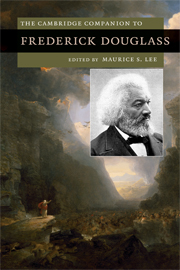Book contents
- Frontmatter
- Introduction
- 1 Douglass’s Self-Making and the Culture of Abolitionism
- 2 Identity in the Autobiographies
- 3 Douglass as Orator and Editor
- 4 Crisis and Faith in Douglass’s Work
- 5 Violence, Manhood, and War in Douglass
- 6 Human Law and Higher Law
- 7 Sentimental Douglass
- 8 Douglass among the Romantics
- 9 Douglass’s Black Atlantic: Britain, Europe, Egypt
- 10 Douglass’s Black Atlantic: The Caribbean
- 11 Douglass, Ideological Slavery, and Postbellum Racial Politics
- 12 Born into Slavery: Echoes and Legacies
- Guide to Further Reading
- Index
4 - Crisis and Faith in Douglass’s Work
Published online by Cambridge University Press: 28 July 2009
- Frontmatter
- Introduction
- 1 Douglass’s Self-Making and the Culture of Abolitionism
- 2 Identity in the Autobiographies
- 3 Douglass as Orator and Editor
- 4 Crisis and Faith in Douglass’s Work
- 5 Violence, Manhood, and War in Douglass
- 6 Human Law and Higher Law
- 7 Sentimental Douglass
- 8 Douglass among the Romantics
- 9 Douglass’s Black Atlantic: Britain, Europe, Egypt
- 10 Douglass’s Black Atlantic: The Caribbean
- 11 Douglass, Ideological Slavery, and Postbellum Racial Politics
- 12 Born into Slavery: Echoes and Legacies
- Guide to Further Reading
- Index
Summary
In the concluding paragraphs of his last autobiography, Life and Times of Frederick Douglass (1881, 1892), Frederick Douglass looks back with justifiable pride at a distinguished life of often stunning accomplishments. What he chooses to emphasize in his final paragraph is his life of service to African Americans, and his comments are both an indication of the challenges he saw and of the philosophy he promoted. Speaking of the black communities with whom he was most closely associated, at times by choice and at times by necessity, Douglass states:
I have aimed to assure them that knowledge can be obtained under difficulties; that poverty may give place to competency; that obscurity is not an absolute bar to distinction, and that a way is open to welfare and happiness to all who will resolutely and wisely pursue that way; that neither slavery, stripes, imprisonment or proscription need extinguish self-respect, crush manly ambition, or paralyze effort; that no power outside of himself can prevent a man from sustaining an honorable character and a useful relation to his day and generation; that neither institutions nor friends can make a race to stand unless it has the strength in its own legs; that there is no power in the world which can be relied upon to help the weak against the strong or the simple against the wise; that races, like individuals, must stand or fall by their own merits; that all the prayers of Christendom cannot stop the force of a single bullet, divest arsenic of poison, or suspend any law of nature.
(LT 913)This is, of course, a demanding sense of mission presented in an equally demanding statement. Included are principles of self-reliance and self-determination, as well as various acknowledgments of the significant obstacles regularly faced by African Americans in a white supremacist nation. Poverty, enslavement, and even bullets are placed next to competency, self-respect, and determination.
- Type
- Chapter
- Information
- The Cambridge Companion to Frederick Douglass , pp. 60 - 72Publisher: Cambridge University PressPrint publication year: 2009
- 1
- Cited by

